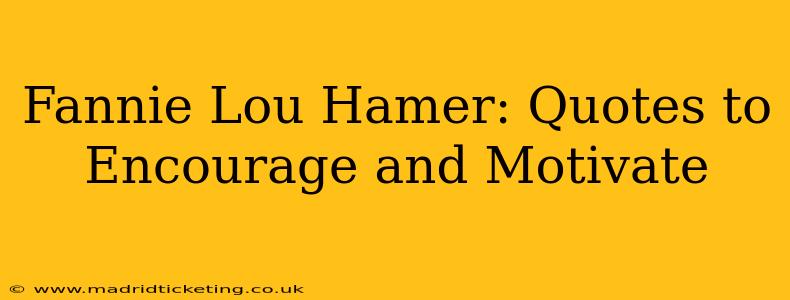Fannie Lou Hamer, a fearless civil rights activist, remains an inspiration for generations. Her unwavering commitment to voting rights, economic justice, and equality in the face of immense adversity continues to resonate. This post explores some of her most powerful quotes, analyzing their enduring relevance and highlighting their ability to encourage and motivate us today. We'll delve into the context surrounding these quotes and examine why they continue to inspire action and hope.
What were Fannie Lou Hamer's most famous quotes?
This is a common question, and the answer depends on what aspects of her activism resonate most with the individual. While there isn't a definitive "top 10" list, certain quotes are frequently cited for their impact and enduring message. We'll be exploring several of these throughout this post, focusing on their meaning and their ability to empower.
What did Fannie Lou Hamer say about voting rights?
Fannie Lou Hamer's tireless work for voting rights is arguably her most significant contribution to the Civil Rights Movement. Her famous quote, "I’m sick and tired of being sick and tired," perfectly encapsulates the frustration and determination felt by countless African Americans denied their fundamental right to vote. This wasn't merely a statement of personal exhaustion; it was a rallying cry for a whole community, igniting the fight for equality and sparking conversations about the systemic inequalities inherent in the Jim Crow South. This quote continues to resonate today, serving as a powerful reminder that complacency is not an option in the face of injustice.
What is Fannie Lou Hamer's legacy?
Hamer's legacy extends far beyond her powerful speeches and unwavering activism. She understood the interconnectedness of voting rights with economic justice and social equality. She established the Freedom Farm Cooperative, a crucial initiative aimed at providing economic independence and self-sufficiency for Black farmers, highlighting her commitment to holistic liberation. Her legacy inspires ongoing efforts to address systemic racism and create a more just and equitable society. She showed us that true freedom requires economic empowerment as well as political rights.
How did Fannie Lou Hamer overcome adversity?
Hamer faced incredible adversity, including brutal beatings, imprisonment, and relentless harassment for her activism. Yet, she persevered. Her resilience stems from a deep faith and a unwavering belief in the moral imperative of fighting for equality. This is perfectly reflected in another of her well-known statements: "Nobody’s free until everybody’s free." This simple yet profound statement encapsulates her understanding of interconnectedness and solidarity, highlighting the importance of collective action in achieving lasting social change. Her strength in the face of oppression serves as an example to us all.
Why are Fannie Lou Hamer's quotes still relevant today?
Fannie Lou Hamer's words remain strikingly relevant because the fight for equality and justice continues. While significant progress has been made, systemic racism and inequality persist. Her quotes act as powerful reminders of the ongoing struggle, urging us to remain vigilant and actively engage in the fight for a more just world. Her legacy challenges us to examine our own roles in perpetuating or dismantling systems of oppression.
What can we learn from Fannie Lou Hamer's life and words?
From Fannie Lou Hamer's life and words, we learn the importance of courage, perseverance, and unwavering commitment to justice. We learn that silence in the face of injustice is complicity, and that even in the face of overwhelming odds, collective action can effect meaningful change. Her legacy is a call to action, urging us to continue the fight for a more equitable and just society, mirroring the tireless efforts she dedicated to her cause.
This exploration of Fannie Lou Hamer's quotes provides a glimpse into her profound impact on the Civil Rights Movement and its enduring relevance today. Her words continue to inspire and motivate us to work towards a more just and equitable world, demonstrating that the fight for freedom is a continuous process that requires unwavering dedication and collective action.

